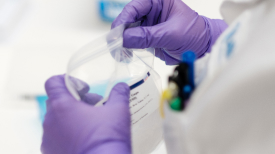- Cancer Care Team
Cancer Care Team
To deliver optimal patient outcomesProducts and Services
Cancer Type
Supplies & Tools
Scientific Focus
- Biopharma Partners
- Patients
- Education & Events
- Login
- Contact Us
Test Details
Use
The Prosigna® breast cancer prognostic assay is an in vitro diagnostic assay that is performed on the IVD enabled nCounter® system using formalin-fixed paraffin-embedded (FFPE) breast tumor tissue previously diagnosed as invasive breast carcinoma. This qualitative assay utilizes gene expression profiling on the PAM50 gene set to generate an intrinsic molecular subtype* (luminal A, luminal B, HER2-enriched or basal-like) and a proliferation score* that are weighted together with tumor size to provide a risk of recurrence score (ROR), and then lymph node status to generate an associated risk category.
The risk category and ROR score are intended to be used to assess a patient's risk of distant recurrence of disease. The intrinsic molecular subtype and proliferation score are not intended to be used for treatment decisions.
The Prosigna® Breast Cancer Prognostic Gene Signature Assay is indicated in female breast cancer patients who have undergone surgery in conjunction with locoregional treatment consistent with standard of care, either as:
1. A prognostic indicator for distant recurrence-free survival at 10 years in postmenopausal women with Hormone Receptor-Positive (HR+), lymph node negative, Stage I or II breast cancer to be treated with adjuvant endocrine therapy alone, when used in conjunction with other clinicopathological factors.
2. A prognostic indicator for distant recurrence-free survival at 10 years in post-menopausal women with Hormone Receptor-Positive (HR+), lymph node-positive (1-3 positive nodes), Stage II breast cancer to be treated with adjuvant endocrine therapy alone, when used in conjunction with other clinicopathological factors. The device is not intended for patients with 4 or more positive nodes.
* The intrinsic molecular subtype and proliferation score are only reported as constituent components of the ROR. Their correspondence with histopathological subtyping is not established.
Special Instructions
The gross size of the patient's primary tumor and nodal status are required to perform the assay. A copy of the original pathology report is required for testing. If a pathology report is not received with the sample, testing will be delayed. Please direct any questions regarding this test to customer service at 800-345-4363. Note the following:
1. Performance characteristics of the Prosigna Assay have been established for postmenopausal women with receptor positive early stage breast cancer treated with 5 years of adjuvant endocrine therapy. Performance with other treatment regimens or in other patient populations has not been established.
2. The Prosigna® assay is not intended for patients with four or more positive nodes.
3. Micrometastases were not considered node-positive during the Prosigna® validation, so they should be considered as negative nodes.
4. Only invasive breast carcinoma is qualified for the Prosigna® assay. DCIS (ductal carcinoma in situ) is not qualified for the Prosigna® assay.
5. The Prosigna® assay is intended for use only on formalin-fixed, paraffin-embedded (FFPE) breast cancer tissue specimens from surgical resections. It is not intended for use on needle biopsy samples or fresh, frozen, or nonbreast cancer tissue.
6. Multifocal breast tumors should not be combined. Each should be considered an independent tumor.
Limitations
1. The Prosigna® Assay has been optimized to use purified RNA extracted from formalin-fixed paraffin-embedded human breast tissue. Other types of specimens or fixatives have not been tested and should not be used.
2. The performance of the Prosigna® assay was validated using the procedures provided in the package insert only. Modifications to these procedures may alter the performance of the test.
3. Performance characteristics of the Prosigna® Assay have been established for postmenopausal women with hormone receptor-positive early stage breast cancer treated with five years of adjuvant endocrine therapy. Performance with other treatment regimens or in other patient populations has not been established.
4. If RNA of insufficient quality or quantity is added to the assay, then the Prosigna® Assay may be unable to give a valid result and instead will report an assay failure.
5. The interpretation of Prosigna® Assay results (ROR Score risk category) should be evaluated within the context of other clinicopathological factors, the patient's medical history and any other laboratory test results.
6. The performance of the Prosigna® Assay has been established with RNA meeting the specifications defined in reference to the procedure above. Performance with isolated RNA that does not meet these specifications has not been established.
7. Known interfering substances to the Prosigna® Assay include genomic DNA and non-tumor tissue (e.g., normal tissue). Please refer to general assay considerations before starting the procedure. The area of viable invasive carcinoma must be clearly identified by a pathologist prior to running the procedure. Additionally, each RNA sample must be treated with DNase.
Methodology
Prosigna® simultaneously measures the expression levels of 50 genes used in the PAM50 classification algorithm, eight housekeeping genes used for signal normalization, six positive controls and eight negative controls in a single hybridization reaction, using nucleic acid probes designed specifically to those genes. In addition, a reference sample is included in the Prosigna® kit consisting of in-vitro transcribed RNA targets for each of the 58 genes. The reference sample is tested with each batch of patient RNA samples to qualify the run and normalize the signal from each gene.
The Prosigna® assay is performed on RNA isolated from FFPE breast tumor tissue. A pathologist examines a hematoxylin and eosin (H&E) stained slide and identifies (and marks) the area of invasive breast carcinoma suitable for the test. The pathologist also measures the tumor surface area, which determines the number of unstained slides required for the test, and the tumor cellularity to ensure the presence of sufficient tumor tissue for the test. A trained technologist macro-dissects the area on the unstained slides corresponding to the marked tumor area on the H&E slide and isolates RNA from the tissue. The isolated RNA is then tested on the nCounter® Dx Analysis System to provide test results including the risk of recurrence (ROR) score and risk category.
Related Documents
For more information, please view the literature below.
Prosigna™: Breast Cancer Prognostic Gene Signature Assay
Specimen Requirements
Information on collection, storage, and volume
Specimen
Formalin-fixed, paraffin-embedded (FFPE) tissue block or slides; fixative should be neutral buffered formalin
Volume
As many as six unstained slides (see table below) at 10 μM and one matching H&E-stained slide or formalin-fixed, paraffin-embedded (FFPE) tissue block. The tumor cellularity percentage within the circled tumor area on the H&E-stained slide must be ≥10%. The circled tumor surface area on the H&E-stained slide must be ≥4mm².
Minimum Volume
See table.
Measured Tumor Surface Area on H&E-stained Slide (mm²) | Number of Unstained Slides |
|---|---|
| 4−19 | 6 |
| 20−99 | 3 |
| ≥100 | 1 |
Container
Slides, blocks
Storage Instructions
Maintain specimen at room temperature.
Causes for Rejection
Tumor block containing insufficient tumor; broken or stained slides; core needle biopsy; DCIS specimen; specimen with four or more positive nodes; fresh, frozen, or nonbreast cancer tissue
Collection
Submit at room temperature. Indicate date and time of collection on the test request form.
Related Tests
Find more tests related to this one.





